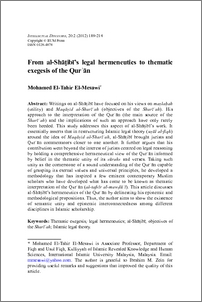El-Mesawi, Mohamed El-Tahir
(2012)
From al-Shāṭibī’s legal hermeneutics to thematic exegesis of the Qurʾān.
Intellectual Discourse, 20 (2).
pp. 189-214.
ISSN 0128-4878
![[img]](http://irep.iium.edu.my/style/images/fileicons/application_pdf.png)  Preview |
|
PDF (From al-Shāṭibī’s legal hermeneutics to thematic exegesis of the Qurʾān)
- Published Version
Download (471kB)
| Preview
|
Abstract
Writings on al-Shāṭibī have focused on his views on maṣlaḥah (utility) and Maqāṣid al-Sharīʿah (objectives of the Sharīʿah). His approach to the interpretation of the Qurʾān (the main source of the Sharīʿah) and the implications of such an approach have only rarely been heeded. This study addresses this aspect of al-Shāṭibī’s work. It essentially asserts that in restructuring Islamic legal theory (uṣūl al-fiqh) around the idea of Maqāṣid al-Sharīʿah, al-Shāṭibī brought jurists and Qurʾān commentators closer to one another. It further argues that his contribution went beyond the interest of jurists centred on legal reasoning by holding a comprehensive hermeneutical view of the Qurʾān informed by belief in the thematic unity of its sūrahs and verses. Taking such unity as the cornerstone of a sound understanding of the Qurʾān capable of grasping its eternal values and universal principles, he developed a methodology that has inspired a few eminent contemporary Muslim scholars who have developed what has come to be known as thematic interpretation of the Qurʾān (al-tafsīr al-mawḍūʿī). This article discusses al-Shāṭibī’s hermeneutics of the Qurʾān by delineating his epistemic and methodological propositions. Thus, the author aims to show the existence of semantic unity and epistemic interconnectedness among different disciplines in Islamic scholarship.
Actions (login required)
 |
View Item |


 Download Statistics
Download Statistics Download Statistics
Download Statistics